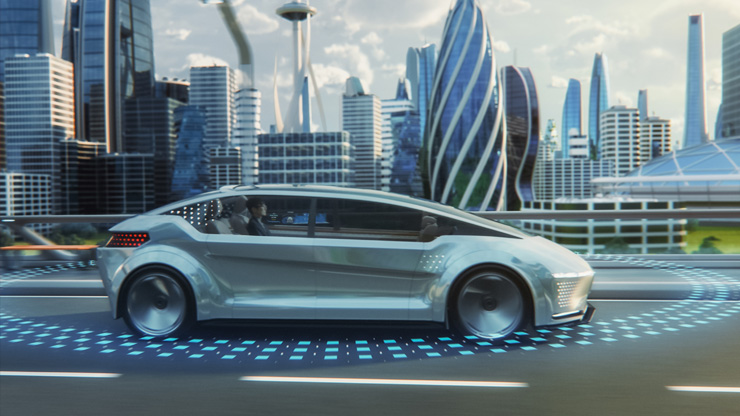
The proliferation of self-driving technology has started to raise some very interesting legal questions. For instance, can a person get a DUI in a self driving car? What about traffic tickets? If the car is in control, am I responsible for its actions? Do I need a license to operate a self-driving vehicle? Currently, state legislative bodies have been slow to react to this paradigm shift in transportation, but we expect the laws to accomodate this newly available technology in the near future.
Tesla has been working on self-driving technology for quite a while and other automakers have followed suit by providing their own versions of autonomous and semi-autonomous driving features. Back in 2019, Elon Musk made the claim that by 2020 their vehicles would be fully autonomous to the point that there would be a fleet of fully self-driving robotaxis that would require no human intervention. Since that statement four years ago, the development of fully autonomous vehicles has sputtered and there has even been a recall of Tesla vehicles equipped with the beta version of full self driving (FSD). The National Highway Traffic Safety Administration (NHTSA) released a statement indicating that it had concerns about the technology saying that the vehicles using the FSD System did not adequately adhere to safety laws and could cause crashes. Specifically, NHTSA claims that the software allows a vehicle to “exceed speed limits or travel through intersections in an unlawful or unpredictable manner and increases the risk of a crash.”
In addition to the concerns from national regulators, there have been several instances where drivers were either asleep or were otherwise unresponsive while operating their vehicle. Currently, any version of autonomous driving technology is supposed to have safeguards that ensure the driver is engaged and monitoring driving conditions and vehicle actions. Most automakers have implemented a system that requires slight pressure to be applied to the steering wheel while the vehicle is in autonomous driving mode. This safeguard, however, has been defeated by several drivers by either placing objects on the wheel that will apply a slight tension, or a sleeping driver with their hand dangling from the wheel. There have been several instances of Tesla drivers asleep at the wheel while their vehicles were in motion. For instance, in September of 2021, police had to get in front of a Tesla vehicle to stop it when the driver was under the influence of alcohol and asleep at the wheel. Most recently, there were reports of a driver asleep while operating her Tesla on the interstate and several passing motorist tried honking their horn in an attempt to wake the driver. Because of this, Tesla and other car companies have started installing cameras within the vehicle that will track the driver’s eyes and determine whether the driver is engaged with the road or distracted.
Despite these concerns, Elon Musk has doubled down on his robotaxi comments by saying Tesla will begin mass production of a fully autonomous vehicle, that is not equipped with a steering wheel or pedals, by 2024. Additionally, once full self driving exits the beta stage, there is talk that Tesla owners will be able to earn extra income by putting their car in robotaxi mode and have it perform ride-share services when they are not using it.
In Illinois, it is currently illegal to operate a motor vehicle while under the influence of drugs or alcohol, regardless of whether the vehicle is being driven manually or through autonomous technology.
While self-driving cars are equipped with advanced technology that allows them to operate without direct human input, they still require a human operator to monitor the vehicle’s performance and intervene if necessary. Therefore, if you are in a self-driving car and you are impaired by drugs or alcohol to the extent that you are unable to take control of the vehicle if necessary, you could potentially be charged with a DUI in Illinois.
The traffic laws in Illinois are extremely strict, especially when it comes to driving under the influence. As the law currently stands, it is illegal to be in “actual physical control” of a vehicle anywhere in the state while you are impaired by drugs or alcohol. The phrase “actual physical control” has come to be broadly interpreted to mean anytime you’re in a car and the keys are nearby. For instance, the appellate court affirmed a DUI conviction of a motorist that was parked on the side of the road, asleep in the backseat of his car, zipped in a sleeping bag, while the keys were laying on the rear floorboard.
Additionally, if you are behind the wheel of an autonomous vehicle, you will still be required to have valid driving privileges and obey all traffic laws. It is not a defense to say that the vehicle was in control during a particular infraction.
It is worth noting, however, that the laws and regulations surrounding autonomous vehicles are still evolving, and it is possible that they may change in the future to account for the unique challenges posed by these vehicles. It will be interesting to see, if and when Tesla actually puts out a fully autonomous vehicle that is not equipped with a steering wheel or pedals, how the legislature and appellate courts will adapt. In my opinion, it would be difficult to make an argument of “actual physical control” when there is no way for a driver to have specific control of a vehicle, other than to input a destination and enjoy the ride.
